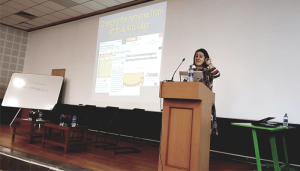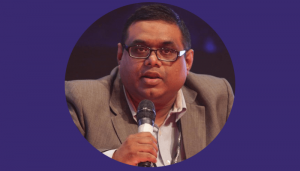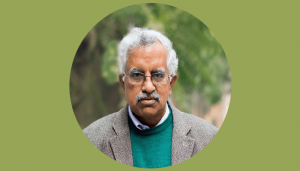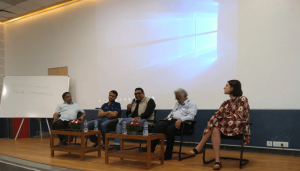In December, IIIT-H hosted a one-day workshop on AI and its impact on society in developing nations. To say that the world as we know it is getting disrupted by recent advances in artificial intelligence is not untrue. Developing nations face challenges aplenty in the realms of education, traffic management, infrastructure use, health management, effective and efficient citizen service delivery and so on. The focus of the workshop was to discuss the use of AI techniques in addressing some of these challenges faced by societies in developing nations.
There were keynote talks by eminent academicians, industry and government scientists, all of whom agreed that AI techniques can be effectively used to address some of societal problems, especially in handling disabilities, health management, disaster management, agriculture related problems etc.
AI Accountability
The ability to handle large data with advances in Machine learning, classification, prediction has made AI more applicable to the larger sections of society in dynamic situations. Hence there is a need to factor in what AI can do for the Society when designing systems. Dr. Lilly Irani, Assistant Professor, Communication, Science Studies, Critical Gender Studies, UC San Diego, who sits on the AI Now Academic Council and whose work contributes to Science and Technology Studies, Human-Computer Interaction, and South Asia studies spoke at length about the need for accountability in AI. According to her, we need to pay attention to the ethics of care, while being aware of the pitfalls of and bias in crowd-sourcing and paid-annotations. While designing sophisticated systems in artificial intelligence, she reiterated the need to stay accountable to society.

AI in Indian context
As the Head of the Data Analytics Cell at Niti Aayog, Dr. Avik Sarkar presented the role of data and AI towards India’s growth. He spoke at length about the modes to overcome issues in data sharing, and also discussed in detail two applications of AI to society, especially relevant to India – the role played by satellite technology in agriculture as well as the role of AI in healthcare with emphasis on cardiac care and diabetic retinopathy.
 Assistive Devices
Assistive Devices
Prof. M. Balakrishnan, Deputy Director, (Strategy and Planning), and Professor, Department of Computer Science and Engineering at IIT-Delhi is a pioneer in development of assistive devices for the visually impaired, having established a research group on Embedded Assistive Technologies for the Disabled (ASSISTech). With a view to making a difference to those who are differently abled, he is committed to end to end development of embedded assistive devices for the disabled such as the SmartCane. He presented his work on this device and spoke about the pressing need for mobility assistance and the future in such areas with the help of AI techniques.

Productivity Enhancement
As Senior Director and Principal Product Manager at Microsoft India, Himanshu Doshi has been leading product development for user experience platform, integration platforms, artificial intelligence, and machine learning. Drawing from his immense experience in the field, Mr. Doshi presented AI techniques to build tools that boost productivity and help in daily recommendations.
 Design and AI
Design and AI
Prof. Molly Wright Steenson, Senior Associate Dean for Research in the College of Fine Arts at Carnegie Mellon University is the author of a book that examines architecture’s interactions with computation, cybernetics and artificial intelligence. At the workshop, she described the need for strong ethics monitoring while developing AI systems and emphasized that design was necessary to ensure that it happened effectively.

Poster Presentation and Panel Discussion
There was a poster presentation related to the theme of the workshop where 6 shortlisted entries were showcased. These engaging posters demonstrated and discussed the use of AI techniques for societal uses. Participants of the workshop were engaged in deep discussions with each of the poster authors. A lively and engaging panel discussion on AI and its effects on society was moderated by Prof. P. J. Narayanan, Director of IIIT-H. Among the ideas that were discussed and debated were the myriad of ways with which to approach AI in society and various factors to consider during engagement.



